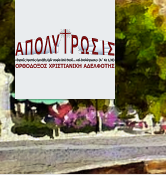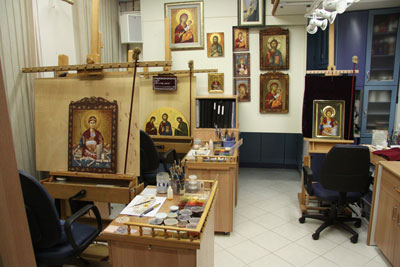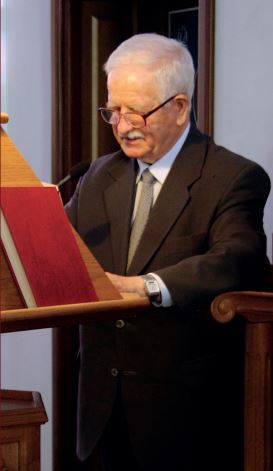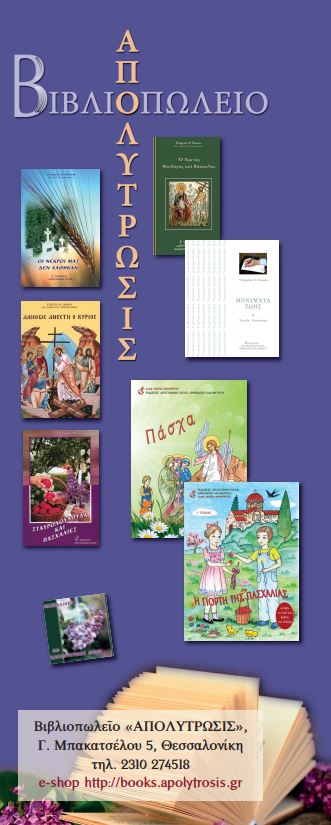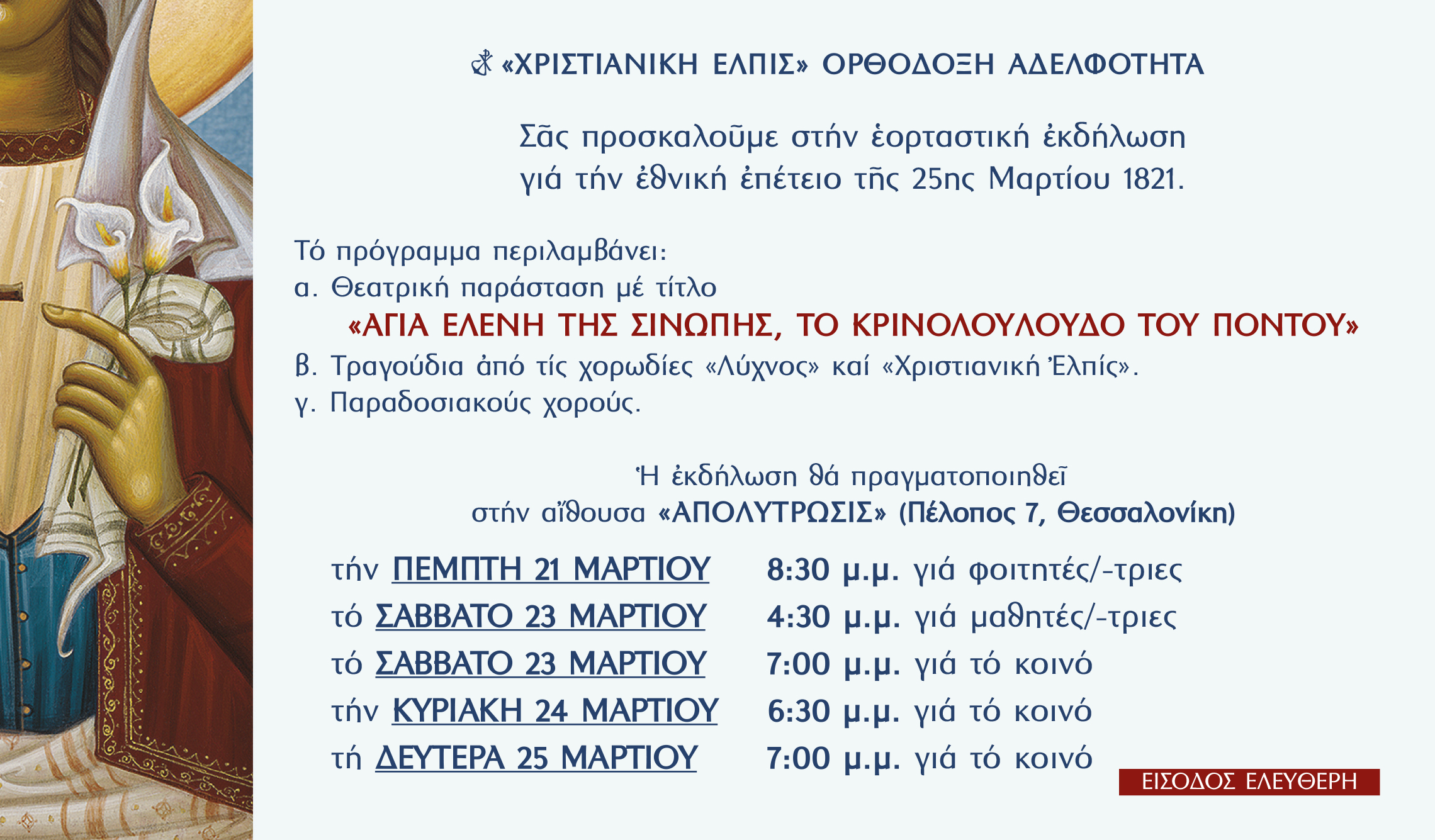 ΑΠΟΛΥΤΡΩΣΙΣ
ΧΡΙΣΤΙΑΝΙΚΗ ΟΡΘΟΔΟΞΗ ΑΔΕΛΦΟΤΗΣ
ΑΠΟΛΥΤΡΩΣΙΣ
ΧΡΙΣΤΙΑΝΙΚΗ ΟΡΘΟΔΟΞΗ ΑΔΕΛΦΟΤΗΣ
Super User
THE MOST HOLY THEOTOKOS
Translation from the book:
Στεργίου Ν. Σάκκου [Read CV], Μηνύματα ζωῆς Β΄, ἐκδ. «ΧΡΙΣΤΙΑΝΙΚΗ ΕΛΠΙΣ» ΟΡΘΟΔΟΞΗ ΑΔΕΛΦΟΤΗΤΑ, Θεσ/νίκη 2015, σσ. 195-197.
The Spiritual Champion
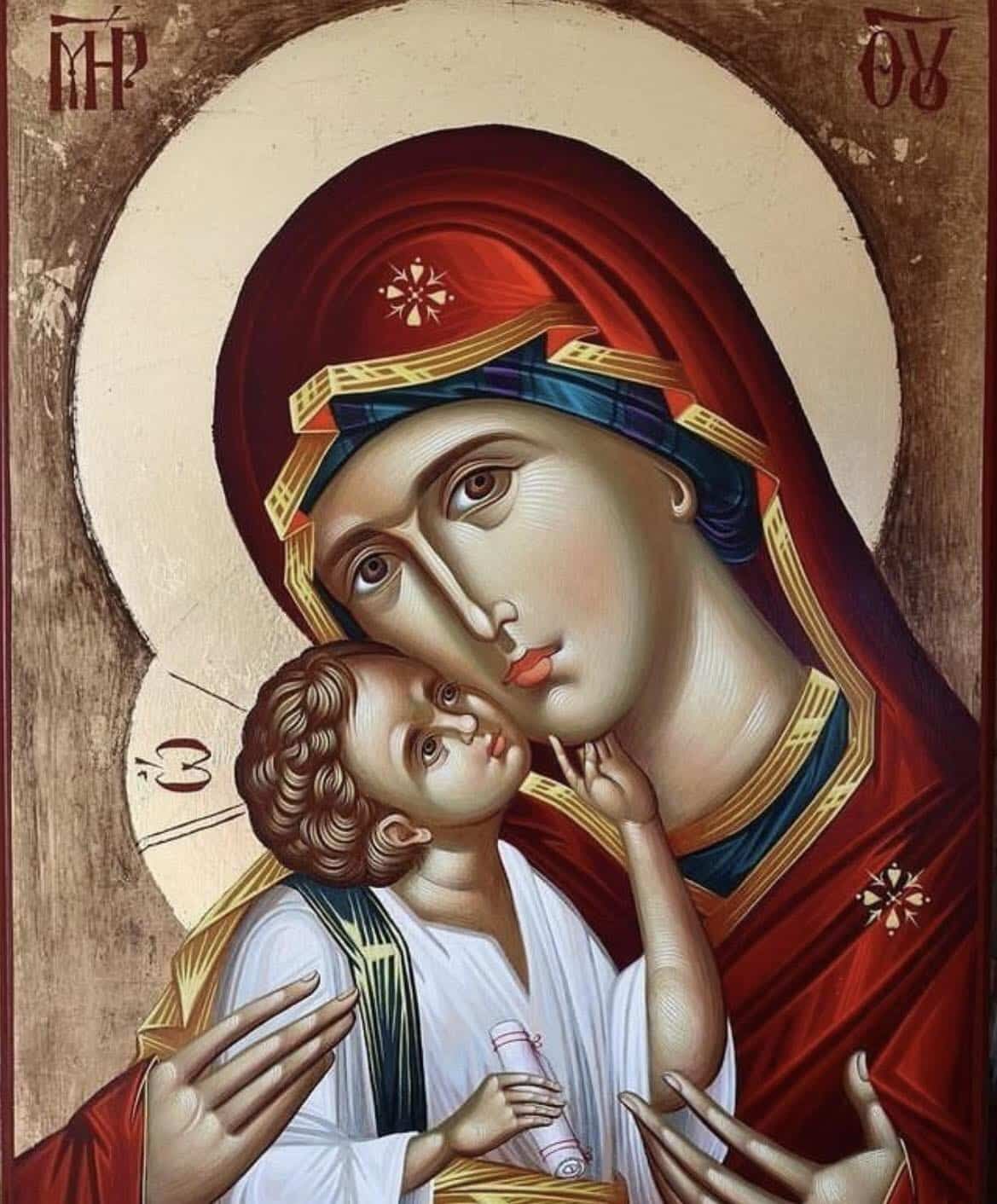 The saints of our faith, like a great cloud, watch from heaven and help us in our struggles here on earth. The first and most glorified among them is the Virgin Mary. Her venerable person is a unique and distinct criterion in Orthodoxy. She attracts our thoughts and inspires our lives. In particular, August, the month of the Virgin Mary, with the daily Parakleses in her honour, her Assumption and the celebration of her “Apodosis”, brings her closer to us. This month draws our attention to her in order to listen to her message.
The saints of our faith, like a great cloud, watch from heaven and help us in our struggles here on earth. The first and most glorified among them is the Virgin Mary. Her venerable person is a unique and distinct criterion in Orthodoxy. She attracts our thoughts and inspires our lives. In particular, August, the month of the Virgin Mary, with the daily Parakleses in her honour, her Assumption and the celebration of her “Apodosis”, brings her closer to us. This month draws our attention to her in order to listen to her message.
There has never been a more worthy athlete or a more glorious Olympic champion in the history of the world than the Virgin Mary. What achievement and what record can be compared to her high jump which united the earth with heaven? She is the one who opened the way for God to come down into the world and become her Son, the God-Man. He raised His Virgin Mother to His own glory and made her the christified person, the first man-God!
The ancient Olympians were honoured for life in their cities, but even today’s winners enjoy some special privileges in their home countries. But the honour and glory of the Virgin Mary is universal and eternal. She is blessed throughout “all generations” (Lk 1:48), as she herself prophesied. And no one can praise her as she deserves, for she is “the praise and glory of the human race”, as St Basil of Seleucia writes.
There may be people who have honoured an Olympic champion by naming their child after him or her. Others are proud to display a photograph of an athlete in their home. Not only countless people, but also towns and villages, churches and chapels, monasteries and associations, are named after the Virgin Mary. There are many honourable surnames that characterise her. And her miraculous icons make her presence alive among us.
From the glory of heaven, as a woman “clothed with the sun” (Rev 12:1) and crowned with the twelve-starred crown, the Virgin Mary nods to us all. As a type of the Church and of every redeemed soul, she is presented as a model and prototype, but also as a counsellor and coach for all those who desire the great victory of life, the victory that will be rewarded with the conquest of heaven.
Copyright © 2021 by Orthodox Christian Association
«ΧΡΙΣΤΙΑΝΙΚΗ ΕΛΠΙΣ» ΟΡΘΟΔΟΞΗ ΑΔΕΛΦΟΤΗΤΑ. Used by permission. All rights reserved.
The Cure of the Paralyzed Man in Capernaum
Translation from the Book
Ὁ Θεός στήν Καινή Διαθήκη, Βοήθημα Κατωτέρου Κατηχητικοῦ Β΄,
ἐκδ. «Χριστιανική Ἐλπίς» Ὀρθόδοξη Ἀδελφότητα, Θεσσαλονίκη 2015, σσ. 56-60
Lk 5:17-26
(For our better understanding it is necessary to mention the way people built their houses
at that time. The houses had a flat roof which was made by heavy tiles and it was supported
by wooden beams. There was an indoor or outdoor ladder in order to have access on the
roof.)
Christ was preaching in a crowded house in Capernaum. Suddenly the silence was
interrupted by a strange noise. Everyone’s eyes turned to the roof where the noise was
coming from. Some people were removing tiles until they made a big hole. Then they started
lowering a bed through the hole by using ropes. On the bed there was a paralyzed man
who couldn’t walk. He had heard that Christ would be in that house and he really wanted
to meet Him. He believed wholeheartedly that Jesus Christ had the power to cure him
from his terrible illness.
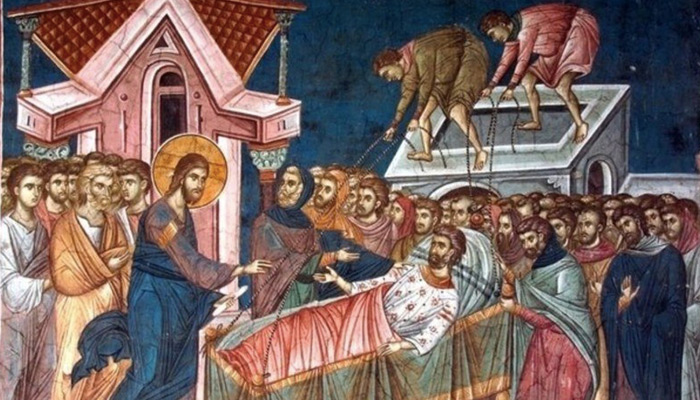 The man’s relatives had been carrying him on the bed but they couldn’t enter the house
The man’s relatives had been carrying him on the bed but they couldn’t enter the house
because there were a lot of people. How could they reach Christ whom they were so eager
to see? Should they leave without achieving their goal? Impossible! They believed that Christ
had the power to cure their sick relative.
Their strong faith prevented them from leaving in disappointment. They were
determined to overcome every obstacle, so they found a solution; to enter the house
through the roof.
They climbed on the roof; they removed the tiles and they lowered the paralyzed man’s
bed through the hole. At last, he was in front of Christ!
Christ looked at him compassionately, not only because of his illness but also because of
his sins. Before his body was paralyzed, his soul had been paralyzed by the number of his
sins. It’s even probable that his sins had caused this serious illness. Christ is omniscient.
His eyes can pierce the depths of the heart. He could see the repentance and the faith of
the man in front of Him.
“My child, your sins are forgiven”, He said affectionately.
Some Pharisees were in house in order to find a reason to make an accusation against
Christ. They thought; “What a blasphemy! Who does he think he is? Who can forgive sins
except for God?”
But Christ is the one and only God. Not only He can forgive sins but He can also
read the thoughts of everyone.
So, He turned to them and said; “Why are you having these thoughts? What is easier,
to tell the man that his sins are forgiven or to tell him to stand up and walk?”
Imagine how the Pharisees must have felt! They were certainly speechless when they
realized that Christ knew their thoughts.
“In order to see that the Son of man - this is how Christ referred to himself – has the
authority to forgive sins on the earth” He turned to the paralyzed man and said; “I tell you
to get up, take your bed and go home”.
To everyone’s astonishment the paralyzed man, who had been carried by four men,
stood up! He lifted his bed and took his way home just as our Lord instructed him! The
amazed people, who had witnessed the event, were discussing; “What extraordinary and
wondrous things our eyes saw today!”
The Sacrament of Confession
Indeed, it is an extraordinary and wondrous event that a paralyzed man stood up walked
home carrying his bed. However, it is not the only thing which should impress us.
Christ read the Pharisees’ minds. He revealed them their thoughts as a proof of His
divinity and as an assurance that He has the authority to forgive sins.
Christ gave this authority also to His disciples after His Resurrection. During His first
appearance among them he said; “Receive the Holy Spirit: Whose soever sins you
remit, they are remitted unto them; and whose soever sins you retain, they are
retained.” (Jn 20:23). This is a great gift to the Church, the Sacrament of Confession.
We can humbly confess our sins to the priest and we can hear the same sweet comforting
words; “My child, your sins are forgiven”. At that moment a miracle happens; the Holy
Spirit erases our sins and our soul is cleansed! How great is God’s love for us!
On the contrary, there is someone who hates us and wants to destroy us: the enemy of
God and the enemy of everything good is the devil. He encourages us to sin and he tries to
prevent us from confessing because he doesn’t want us to become free from our sins.
Let’s see some of the obstacles he puts in our way:
a. Shame. He minimizes the feeling of shame when he motivates us to sin, but he
magnifies it when we want to confess. In other words, we don’t feel any shame when we
speak or behave in a bad way but we feel ashamed to confess it. However, Christ knows
everything, even our thoughts. He knows what we did, even in secret and he is waiting for
us to confess it so that He can cleanse us. Then, why should we feel ashamed? During
Confession we see Christ in the face of the priest. Would we be ashamed to tell the doctor
about our illness? The Confession is the remedy for our soul. We show truthfully the illness
of our soul to the priest so that he can give us the appropriate medicine with his enlightened
advice. He doesn’t expect us to talk about our achievements or virtues. He expects to hear
our sins and he feels happy when he sees our honest repentance.
b. Postponement. If we overcome the obstacle of shame, the devil presents us with
another one; postponement. “You can go to confess. But not right now, another time” he
whispers. But why should we wait? If we fall in the mud, won’t we go and change clothes
immediately? If we get sick, will we delay making a doctor’s appointment? So why should
we postpone our confession which will cleanse our soul from its muddy sins and heal it from
all wickedness?
We should rush happily to confess every time we get the chance. It’s the Sacrament
given to us by the love of God so that we can hear His sweet voice; “My child, your sins are
forgiven”.
I overcome every obstacle
Shame and procrastination.
Only when I go to confess
I enjoy my soul’s purification.
Copyright © 2021 by Orthodox Christian Association
«ΧΡΙΣΤΙΑΝΙΚΗ ΕΛΠΙΣ» ΟΡΘΟΔΟΞΗ ΑΔΕΛΦΟΤΗΤΑ. All rights reserved
ΤΡΕΙΣ ΚΑΤΗΓΟΡΙΕΣ ΕΝΑΝΤΙΟΝ ΤΟΥ ΧΡΙΣΤΙΑΝΙΣΜΟΥ
ΤΡΕΙΣ ΚΑΤΗΓΟΡΙΕΣ ΕΝΑΝΤΙΟΝ ΤΟΥ ΧΡΙΣΤΙΑΝΙΣΜΟΥ
 Κατηγοροῦν τήν πίστη μας ὅτι: α) Ἐπικεντρώνει τό ἐνδιαφέρον της στή μέλλουσα ζωή καί περιφρονεῖ τήν παροῦσα... β) Προβάλλει τά πνευματικά ἀγαθά καί ἀδιαφορεῖ γιά τά ἐπίγεια... γ) Ἐνδιαφέρεται γιά τήν ψυχή καί ὑποτιμᾶ τό σῶμα...
Κατηγοροῦν τήν πίστη μας ὅτι: α) Ἐπικεντρώνει τό ἐνδιαφέρον της στή μέλλουσα ζωή καί περιφρονεῖ τήν παροῦσα... β) Προβάλλει τά πνευματικά ἀγαθά καί ἀδιαφορεῖ γιά τά ἐπίγεια... γ) Ἐνδιαφέρεται γιά τήν ψυχή καί ὑποτιμᾶ τό σῶμα... Saint Polykarpos (23rd of February)
Translation from the Book
Ὁ Θεός στήν ἱστορία τῆς Ἐκκλησίας, Βοήθημα Κατωτέρου Κατηχητικοῦ Γ΄,
ἐκδ. «Χριστιανική Ἐλπίς» Ὀρθόδοξη Ἀδελφότητα, Θεσσαλονίκη 2016, σσ. 106-110
Bishops dedicate their lives to Christ and His Church. We have a close relationship with our Bishop. We are his family, along with every person who belongs to his diocese. He prays for us and cares for us, so let’s love him and remember him in our prayers.
Bishops are also called pastors because Christ has entrusted to them the flock of His Church. Like a good shepherd who watches over his flock, a bishop watches over the members of the Church.
He is a respected person because he stands in the place of Christ, he is the successor of His Apostles! That is why we address him as “Your Reverence”. When the Bishop visits our church and gives us his fatherly blessing, it is an honour and a joy.
Here we will present a saint bishop. He is one of the first links in the holy chain of bishops, which begins with the apostles and continues to the present bishops of the Orthodox Church.
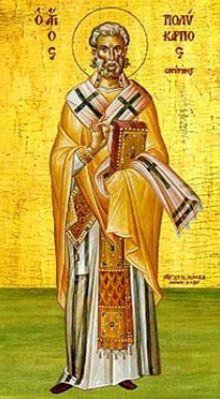
So Polykarpos was wanted. He wasn’t upset when he was informed about it. Nor did he want to run away to save his life. After much effort, he was persuaded to move to a house outside the city. But someone revealed his hiding place. Soldiers came to his door.
“I’m looking for Polykarpos”, said the centurion.
The elder Polykarpos came descending the stairs with a beaming face. He was 86 years old.
“I will come with you”, he said calmly. Then he turned to his students: “Bring some food for the soldiers, they are very tired.”
The soldiers were confused. What kind of man was he? They had come to arrest him and he wanted to offer them hospitality. However, they accepted. They sat down to rest and eat. Polykarpos asked their permission;
“May I fulfill my responsibilities while you eat?”
He wasn’t refused. So Polykarpos withdrew to a private place to pray. He prayed earnestly for his flock, for the Christians in danger, for his persecutors and for all the people.
When he had finished praying, he surrendered to the soldiers. His face was so radiant that the soldiers were dazzled. They regretted arresting such a man, but they had orders to obey.
Bishop Polykarpos was taken to the stadium in front of the proconsul. At first, he tried to flatter him;
“Have pity on your years, old man! Deny Christ and I will set you free!”
“I have served Him for eighty-six years and He has never wronged me. How can I deny my King and Saviour?"
“I will feed you to the beasts if you don’t change your mind!”
Polykarpos gave a wise answer;
“A person can only repent and change their mind by moving from a false idea to the truth. I could never leave something better, namely Christ, and choose something worse, namely to worship a man!”
“I’ll throw you into the fire if you don’t fear the beasts!”
“What are you waiting for? Do whatever you want!”
They did indeed throw him into the fire. But what a spectacle! The fire respected him! It formed an arc and didn’t touch him! The elderly bishop was finally executed with a sword, and Christ rewarded him with the crown of eternal glory. His memory is celebrated on 23 February.
Respect for the Priests
Even the fire respected the bishop! Every bishop and every priest is worthy of respect. St Kosmas the Aetolian said: “If I meet a priest and an angel, I will first greet the priest, kiss his holy hands and then greet the angel”. Have we ever thought about how much we owe to priests? It is clear that priests make an invaluable contribution to the lives of Christians.
When we were 40 days old, the priest held us in his arms and took us into church for the first time. From that moment until we depart from this world, he will be with us in joy and in sorrow.
• The priest baptised us and we became children of God.
• At the priest’s hand we receive communion, the body and blood of Christ.
• God has given priests the right to forgive our sins through the Mystery of Confession.
• If we are suffering from a serious illness, we ask the priest to come to our home and perform the Mystery of Holy Unction, for the healing of body and soul.
• At the beginning of the school year, the priest comes to the school to perform the Blessing of Water, so that the school year is blessed and the teachers and students have God’s enlightenment.
• The priest performs the Mystery of Marriage. He crowns and blesses the new couple.
• Priests organise the distribution of food in our parishes. With paternal love, they make sure that no one goes hungry.
• They feed our souls with the eternal words of the Gospel!
• We ask the priest for advice when we are in a difficult situation, because he is God’s representative!
These are the reasons why we should respect and honour God’s priests!
How do we show our respect?
• We stand reverently before him.
• We greet him whenever we meet him.
• We kiss his hand and ask for his blessing.
Unfortunately, there are people who speak ill of priests. They are quick to blame them for mistakes. It is possible for priests, who are also human beings, to make mistakes. We sin when we condemn a person. But it is a greater sin to make accusations against priests.
To God’s priest I will show respect
he prays to Christ for me to protect.
A Story from Kongo
Translation from the Book
Ὁ Θεός στήν ἱστορία τῆς Ἐκκλησίας, Βοήθημα Κατωτέρου Κατηχητικοῦ Γ΄,
ἐκδ. «Χριστιανική Ἐλπίς» Ὀρθόδοξη Ἀδελφότητα, Θεσσαλονίκη 2016, σσ. 85-90
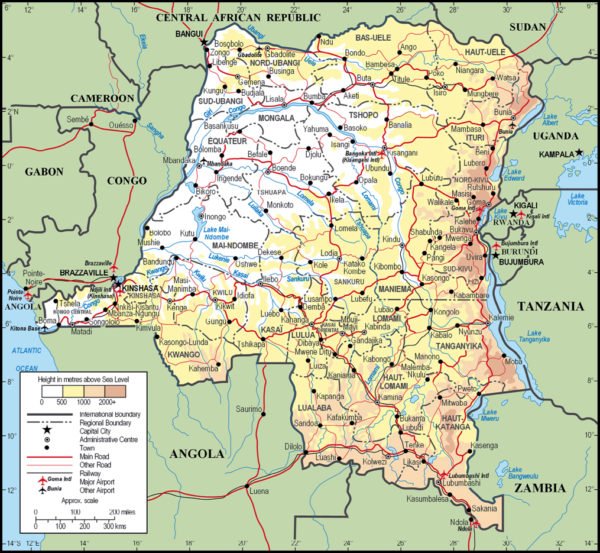 In Kongo, a city of Africa, orthodox missionaries have been preaching about Christ and His Gospel for many years. After a group Baptism, when a lot of Africans were baptised, a little child approached a missionary named Aggeliki. His eyes were full of anxiousness.
In Kongo, a city of Africa, orthodox missionaries have been preaching about Christ and His Gospel for many years. After a group Baptism, when a lot of Africans were baptised, a little child approached a missionary named Aggeliki. His eyes were full of anxiousness.
“Sister, when is my turn to get baptised?”
“But you haven’t asked to get baptised, little one” she kindly responded.
“I didn’t know, sister, I didn't know I had to ask...Can I get baptised now?”
The missionary explained to him that he needed his parents’ permission. The little boy left feeling sad because his parents objected to it. Would he be able to change their mind?
His desire to get baptised was so strong that he actually managed to get their approval. He got baptised and he was named after St Basil the Great. From the day of his Baptism he was like a new boy, his face was glowing! He was excited because he felt the God of the Heavens as his own father! His heart was full of love for Christ and for all the people.
However, after a while, he came back to Aggeliki, anxious again.
“Sister, my little sister is very sick, she is going to die.”
“I’m so sorry to hear that Basil” she responded gently.
“But she isn’t baptised. How can we get her baptised?” he continued.
“Does she want to?”
“She doesn't know about all that... she doesn’t go to the school of the Mission. But she can’t die without being baptised, can she? It’s so terrible!”
“Let’s pray for her Basil and Christ may help her.”
A few days later Basil’s eyes were red, full of tears. He fell into Aggeliki’s arms when he saw her.
“My sister is dead” he said out of breath.
The missionary caressed his curly black hair.
“I did something, but I don’t know if it was the right thing to do...For the past couple days my sister had been so weak that she couldn’t even open her eyes. I watched her die and I prayed to Christ for her. Then I caressed her forehead and asked her if she wanted to get baptised. She didn’t respond. I don’t know if she could hear me. I shook her a bit and asked again. I told her: “Christ loves you and He wants to save you. He wants to keep you close to Him in heaven where nobody dies”. She opened her eyes a bit and nodded as if she was saying yes. I took the glass of water that was by her side and poured it on her head and said 'In the name of the Father and the Son and the Holy Spirit.' The priest had told us that we are allowed to do this in case of an emergency. Was it the right thing to do sister?”
He asked with tearful eyes, but Aggeliki couldn’t respond because her eyes were full of tears, too. She thanked God from the bottom of her heart because little Basil had fully understood the value of Baptism. Thanks to him, his little sister was in the arms of God, along with saints, as a citizen of heaven!
The Mystery of Baptism
Have you ever thought what a great blessing it is to have been baptised since we were babies? Since then, we are God’s children. Since the day we got baptised, we have been able to receive the Holy Communion, His flesh and His Blood. There are children, even in our country, who can’t enter the church during liturgy, because they aren’t baptised.
Our Baptism is one of the most important events in our life. Celebrating Christ’s Baptism, which signifies the end of the period of the Holy Twelve Days, is the perfect timing to approach this great Mystery of our Church. Consequently, every time we are invited as guests to a Baptism, we will realize the marvellous event better and our joy will be greater.
Right before the mystery of Baptism begins, Catechism takes place at the narthex of the church. The priest asks “Do you renounce satan?” and then “Do you join Christ?”. The child, who is usually an infant, can’t answer for himself/herself. The person who answers these questions is the godparent. The godparents proclaim their faith by reciting the Creed. From then on, they have the sacred task to guide their godchildren, to help them learn about their faith, to encourage them to attend Sunday school.
After the completion of the Catechism, the priest stands in front of the Baptismal font and prays for all the people. He also reads two blessings for the water and the oil. They both have a symbolic meaning. Wrestlers used to apply oil on their skin before they entered the arena. Likewise, the child’s whole body is anointed with oil to prepare him/her for wreslting against sin. Water is used for cleaning, so the water of Baptism cleanses us of sin with the power of the Holy Spirit.
Then the Baptism is administerd. Three times the priest immerses the child in the water of the font and lifts him/her up saying “In the name of the Father and the Son and the Holy Spirit.” This is done three times because our God is Triune; one God but three persons, Father, Son, and Holy Spirit. Also, these three immersions in the water symbolise the Christ’s three-day death and His Resurrection. The child symbolically joins Christ by being immersed in the water and then lifted up; in this way, he/she dies along with Christ and is resurrected along with Christ. The child is now a new person, a newly enlightened christian.
Then the mystery of Confirmation follows. The priest anoints the main body parts with the Holy Oil, a sanctified fragrant oil. In this way he puts the Holy Spirit’s seal on the new christian. He seals the forehead in order for the christian to always have virtuous thoughts, the hands to always do the right thing, the legs to follow Christ’s path, the chest to always love God.
After the Confirmation, the priest cuts off some of the baby’s hair and with the sign of cross throws it in the water of the font. This act declares that the new christian is determined to cut off his sinful desires and devote himself/herself completely to God.
Then the priest, along with the godparent who is holding the baby, circle the font three times while the choir is chanting “As many of you as have been baptised into Christ, have put on Christ. Alleluia.” This hymn is usually chanted on great holidays like Christmas, Epiphany, and Easter because in old times group Baptism took place on these holidays. What does it mean that we have put on Christ? It means that we think, we wish, we decide, we lead our lives as Christ would. By doing so we become true christians and we honor the holy Baptism we received.
Throughout the mystery of Baptism some children hold lit candles. This act symbolizes the mission of the new christian which is to be a light of Christ in the world. Then, the baby is dressed in clean white clothes which symbolise the cleansing and the sanctity of his/her soul. The priest puts the cross on the baptised child; the cross is the most sacred symbol of our faith and the most valuable guardian.
It is truly amazing; after our Baptism we are no longer simple people, we are the children of Christ our king, white and shiny in body and soul! We are able to earn paradise again; the paradise that Adam and Eve lost due to their disobedience to God. The mystery of Baptism cleanses us from this very first sin that we inherited from Adam and Eve, the original sin. Since we are excused from that, we become the children of God again and we are members of His family, the Church.
May we keep our souls pure and enlightened by the Christ’s light throughout our lives as they were on the day of our Baptism.
In the font of the Church
I become Your child.
Help me, Christ
to keep my soul enlightened and clean
throughout my life.
Saint Kyranna (28th February)
Translation from the Book
Ὁ Θεός στήν ἱστορία τῆς Ἐκκλησίας, Βοήθημα Κατωτέρου Κατηχητικοῦ Γ΄,
ἐκδ. «Χριστιανική Ἐλπίς» Ὀρθόδοξη Ἀδελφότητα, Θεσσαλονίκη 2016, σσ. 111-115
Imagine you are walking through a vast territory where everything is covered in snow and suddenly you come across a beautiful, fragrant flower. That seems wonderful and strange at the same time. How has this flower managed to survive the frost and bloom during the hard winter? Like this flower, the Saint we are going to talk about, spread the scent of Christ during the dark years of Ottoman slavery. Her memory is celebrated on the 28th of February.
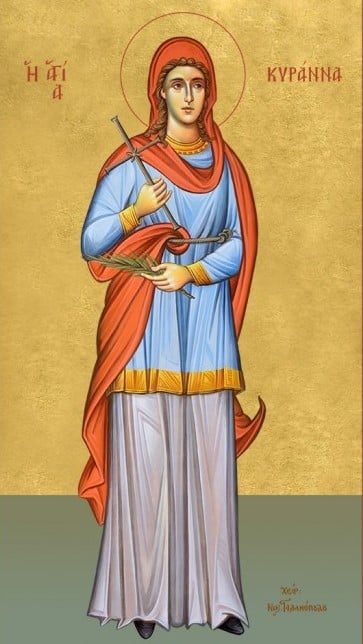 Greece is under the Turkish yoke in 1751. A pious family lives in the small village of Avisoka -now Ossa- just a few kilometres from Thessaloniki. The parents kept their faith in God alive in their hearts and brought up their only daughter, Kyranna, with it. She grew into a beautiful young woman whose face reflected her virtue and kindness. Her beauty impressed a subashi who had come to her village to collect taxes from the enslaved Greeks for the Turks. He was a janissary, which means that he was born by Greek parents but he was forcefully taken by the Turks and brought up as a Turk. When he saw Kyranna, he wanted to make her his wife. He approached her and asked her to deny Christ and convert to Islam, that is, to promise to worship Allah. He promised her a prosperous life with riches, titles, honors, fame and all kinds of pleasure. She answered firmly: “It is better for me to die than to deny Christ!”
Greece is under the Turkish yoke in 1751. A pious family lives in the small village of Avisoka -now Ossa- just a few kilometres from Thessaloniki. The parents kept their faith in God alive in their hearts and brought up their only daughter, Kyranna, with it. She grew into a beautiful young woman whose face reflected her virtue and kindness. Her beauty impressed a subashi who had come to her village to collect taxes from the enslaved Greeks for the Turks. He was a janissary, which means that he was born by Greek parents but he was forcefully taken by the Turks and brought up as a Turk. When he saw Kyranna, he wanted to make her his wife. He approached her and asked her to deny Christ and convert to Islam, that is, to promise to worship Allah. He promised her a prosperous life with riches, titles, honors, fame and all kinds of pleasure. She answered firmly: “It is better for me to die than to deny Christ!”
The janissary persisted. He tried to flatter her: “You are so beautiful! It would be a pity to sacrifice your youth and your life! You deserve titles and riches at my side.” Kyranna wasn’t moved and bravely responded; “My youth and my whole life belong to Christ!”
The subashi was enraged. He couldn’t accept such an insult, to be so blatantly rejected by a young slave. He started shouting threats that he would torture her severely. Kyranna didn’t cower and said fearlessly; “I was born a Christian and I will die a Christian!”. But she would pay the price for her words.
They sent her to the judge in Thessaloniki and they slandered her. They lied that Kyranna had agreed to convert to Islam and marry the subashi but then she changed her mind. Kyranna calmly responded; “I am a Christian and I belong to my Lord Jesus Christ. I have loved Him since my childhood. I am ready to shed my blood for His love. This is my final answer.”
The Turks were embarrassed by the young Christian, so they decided to put her in prison. But the subashi was not satisfied with this punishment. He went to the prison every day, bringing along other janissaries with him and they tortured Kyranna mercilessly. They beat her till she fainted. The other prisoners who witnessed this injustice protested, but this made the Turks even more violent. Before they left, they ordered the prison guard to torture her even more. Indeed, at night, he hung her by her armpits with chains and beat her with any object he could find. He left her hanging to suffer her pains and freeze in the winter cold. It was only when he had calmed down a little that a Christian guard pleaded with him to let him take her down.
Kyranna did not complain at all, but endured everything in silence. She never stopped praying.
It was the 28th of February 1751. The prison guard had beaten her so badly that night that he had slashed her body. Christ called her to be close to Him. The blessed time had come for her soul to meet Christ and receive the glorious crown of heaven.
The other prisoners immediately understood what had happened, because at dawn a light shone in the prison cell where the saint’s body was hanging. A lightning flash surrounded the saint’s body and the whole prison was illuminated. The christian prisoners started praying; “Lord have mercy on us”, the Jews fell on their face, and some Turkish women cried; “The abuse of this poor Greek has fallen on us like lightning to burn us”. The prison guard trembled with fear and he ordered the christian guard to take her down. Then the light faded. But a wonderful scent remained in the prison for a long time.
The Turks were so upset by these miraculous events that they didn’t prevent the Christians from taking the body of Kyranna. They buried her respectfully and distributed pieces of her blood-stained dress as a blessing. They praised God for strengthening young Kyranna to remain faithful and thanked Him for showing her sanctity with the light and the scent in her prison.
Today there is a magnificent church in her name in the village of Ossa. Until 2011, people could only kneel before her icon, but on the 12th of September 2011, her relic was found while digging under the Sanctuary of the church of Taxiarches! Since then, many pilgrims have visited her church to venerate her sanctified relic and ask for her intercession.
A Courageous Witness
How touching is the story of saint Kyranna! There are so many aspects of her life to admire. This young girl was truly a fragrant flower in the freezing cold of slavery.
Would you like to follow Kyranna’s example of faith and her courageous witness? Today, we are not officially asked to change our faith nor are we threatened with a death. But we do face another challenge; people sometimes make fun of us or are sarcastic towards us for
• going to church and Sunday school
• making the sign of the cross when we pass a church
• living our lives the way Christ wants us to live, not the way many people want us to live.
We are in a difficult situation because the people making fun us may be our classmates, colleagues, neighbors or relatives.
So what can we do?
√ Will we be influenced by those who do not care about God’s will?
√ Will we be too embarrassed to make the sign of the cross?
√ Will our love for Church and Sunday school diminish?
√ Will our fragrant flower of faith survive the climate of irony and unfaithfulness?
√ Will the light of Christ continue to shine in us to enlighten those around us?
Fortunately, there are people who are like saint Kyranna! The fire of faith is kindled in their hearts and they say, as she did; “Since I was a little child, I have loved Christ and I want to love Him all of my life!” Thanks to these people, the Light will not be extinguished in the world! Hope will not be lost in the freezing cold of unfaithfulness.
Let us ask for the intercession of Saint Kyranna, who bravely proclaimed her faith, so that we may become like fragrant flowers for Christ, eternal flowers of heaven!
Saint Kyranna I ask for your help
to be always faithful.
Like a flower in the freezing cold
to my Christ praiseful!
Ἐκδήλωση μνήμης
Λατρευτικές συνάξεις

Στόν Ἱερό Ναό Ἀναλήψεως τοῦ Σωτῆρος, στήν Ὀρθόδοξη Ἀδελφότητα «Χριστιανική Ἐλπίς»,
στήν περιοχή Φιλύρου Θεσ/νίκης,
τελεῖται κάθε Κυριακή Ὄρθρος καί Θ. Λειτουργία.
